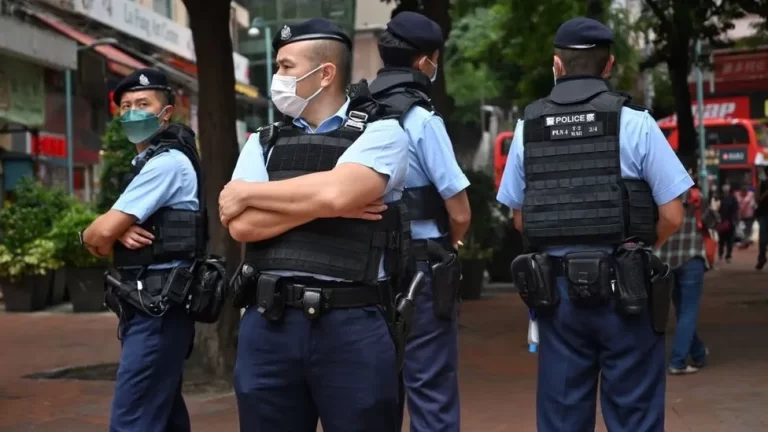Hong Kong is set to pass its own version of a Beijing-imposed national security law which has raised fears civil liberties will be further eroded.
A full draft of Article 23, which covers treason, sedition and state secrets, was tabled on Friday. The city's leader John Lee called for it to be passed “at full speed”. Beijing and Hong Kong both credit the security law with helping to restore stability in the city after widespread pro-democracy protests in 2019.
It is believed that more than 100 people have been arrested under the 2020 Beijing-imposed law which made it easier to prosecute protesters and reduced the city's autonomy. Mr Lee said a local version of the law was necessary to guard against “potential sabotage and undercurrents that try to create troubles” particularly “”ideas of an independent Hong Kong”.
How soon can the law pass?
With a legislature dominated by the pro-Beijing camp, the bill is widely expected to be passed with little opposition – some reports suggest this could happen as soon as early April, while the Hong Kong Democracy Council said it “can pass practically within 24 hours”.
The first two readings of the bill concluded by early afternoon on Friday.
The law was tabled a week after the end of a month-long consultation period – this is shorter than a three-month consultation provided in 2003, when an attempt to legislate the bill was shelved after massive protests.
Back then, half a million Hongkongers came out onto the streets in protest, with more than 90,000 submissions made during the consultation process. Not only did then-chief executive Tung Chee-hwa's administration withdraw the legislation, the strong opposition also saw the resignation of security minister Regina Ip.
The government claims this second attempt to introduce the law saw a 99% support rate during its public consultation. On Friday, China's Vice Premier Ding Xuexiang said swift enactment of the law would protect “core national interests” and allow Hong Kong to focus on economic development.
What is in the new bill?
The 2024 version of Article 23 allows for closed-door trials and gives the police rights to detain suspects for up to two weeks without charge. The city's leader will also be given authority to ban organisations and companies from operating in Hong Kong, should they be found “working for foreign forces”.
The draft bill expands on the Beijing-imposed national security law, which already criminalises secession, subversion, terrorism and collusion with foreign forces. Here are some of the new offences it covers.
- Theft of state secrets and espionage: The bill has a broad definition of “state secrets”. It includes “major policy decisions”, “economic or social development” and Hong Kong's “external affairs”, among other things. The wording in this section of the bill is almost identical to China's state secrets law, which Beijing is looking to broaden.
- Sabotage endangering national security: This is a new offence that targets people who endanger national security either intentionally or by “being reckless”. It also wants to criminalise computer-related acts that harm national security. Doxxing – the malicious act of publishing people's personal information online – of police officers was cited in the consultation paper as a possible example of such an offence.
- External interference: This new offence will deal with acts of collaborating with “external forces” to influence or interfere with national and local authorities. Examples include receiving financial support or direction from these “external forces”, which could include foreign governments, political organisations or individuals.
- Insurrection: This will deal with acts such as assisting an armed force – or the organisation to which the force belongs – in an armed conflict against China. Authorities have repeatedly cited unrest due to the months-long pro-democracy protests in 2019 as grounds for legislating this new offence.
- Treason: In addition to treason, which includes offences such as levying war against China, the new bill seeks to criminalise unauthorised military drilling and “misprision of treason”, committed by someone who has knowledge of treason but does not report it.
What are critics saying?
Hong Kong officials have justified Article 23 by saying that most offences outlined in the legislation are also covered under similar laws in Western jurisdictions. However, critics say the new law will give authorities yet another tool to crack down on dissidents and erode freedoms promised to the former British colony when it returned to Chinese rule in 1997.
Article 23 will “take repression to the next level”, said Amnesty International's China Director Sarah Brooks. “The rapid progression of legislation under Article 23 shows the government's eagerness to further dismantle human rights protection and turn its back on its international obligations,” she said.
The political motivation behind this new bill appears to be “more important than any practical need”, said Eric Lai, research fellow at the Georgetown Center for Asian Law.
“The current Beijing-imposed national security law has already silenced dissent and the voices of civil society. Hong Kong has also not seen any large-scale demonstrations in the past three-and-a-half years,” he told BBC Chinese.
Mr Lai also questioned if due process could be upheld when lawmakers are asked to scrutinise a bill so quickly.
“How authorities have tried to speed up the consultation and legislation has created an impression that the consultation exercise was conducted purely for the sake of formality,” he said. Former lawmaker Emily Lau believes the new law is “all part of Beijing's policy towards Hong Kong”.
“The [Chinese] central government really does not need to be so heavy-handed in dealing with Hong Kong. We are a small city, who are we to jeopardise national security,” she said. Liu, who once chaired Hong Kong's Democratic Party, added that the previous attempt to legislate Article 23 drew passionate discussion and debate which was “allowed by the government”.
“This time, I can't quite see it, it's a totally different atmosphere. Hong Kong then and now are like two worlds,” she said.
— CutC by bbc.com


